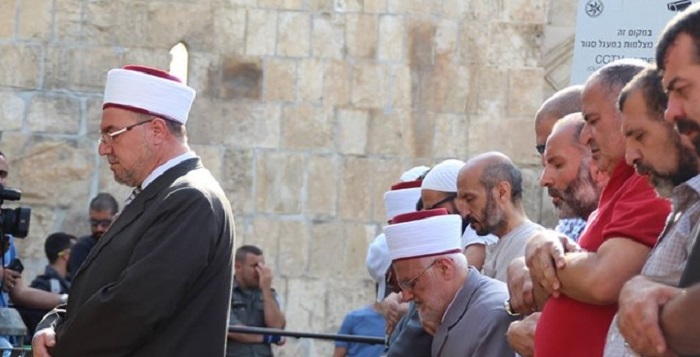As tensions remained high in the occupied Palestinian territory, with Fatah leaders calling for a Day of Rage to protest Israeli restrictions at Al-Aqsa Mosque compound, Palestinians in occupied East Jerusalem continued to organize sit-ins and perform prayers in the streets outside the holy site’s gates for the third day on Tuesday.
Israeli authorities have imposed heightened restrictions at Al-Aqsa following its temporary closure when a deadly attack left three assailants and two police officers — all Palestinian citizens of Israel — dead in and around Al-Aqsa Mosque compound in the Old City on Friday.
Worshipers have performed prayers at the Lions’ Gate leading to Al-Aqsa since the attack to express their rejection of the Israeli security procedures — including the installation of metal detectors and security cameras at the entrances of Al-Aqsa.
Sheikh Abd al-Athim Salahb, chairman of Jerusalem’s United Council of Waqf, or the Islamic Trust — responsible for running Al-Aqsa Mosque compound, told Ma’an on Tuesday that Palestinians have collectively refused to pass through newly installed metal detectors at the holy site, and demanded that the Israeli-imposed measures be “removed immediately” to allow Muslim worshipers free access to the site.
“The occupations want to change the historic situation in the mosque and implement its plans to divide it both in time and place. But this can’t be accepted since Al-Aqsa, its courtyards, mosques, and passageways are all purely Islamic properties,” Salahb told Ma’an.

Palestinians have long feared that Israeli policies restricting Palestinian access to Al-Aqsa could change the status-quo of the site, which remains under Jordanian control and prohibits non-Muslim worship. However, the site is open to all groups during designated visitation times.
As rights groups and activists have pointed out, Palestinian concerns are not unfounded. Following the Ibrahimi Massacre in Hebron in 1994, Israeli authorities divided the mosque in half, splitting it into a synagogue for Israeli settlers and a mosque for Palestinians.
Palestinians have long accused the Israeli government of using Israeli-Palestinian violence and tensions as a means of furthering control over important sites in the Palestinian territory. To this day, Palestinians in Hebron must pass an Israeli-installed checkpoint in order to access the Ibrahimi Mosque.
Sheikh Ikrima Sabri, head of the Higher Islamic Committee, told Ma’an that religious leaders have continued to organize meetings regularly in order to resist Israel’s new measures. He added that Muslim leaders have been in contact with Jordan, the Organization of Islamic Cooperation, and the Arab League, concerning the metal detectors, which Israeli authorities “have installed in order to impose full sovereignty in Al-Aqsa.”
“We reject this completely and confirm that Muslims have been given sovereignty over Al-Aqsa Mosque by divine order,” he stated.

Sheikh Wasif al-Bakri, the supreme judge of Palestine, pointed out that Al-Aqsa essentially “remained close for the fifth day” owing to continued restrictions at the re-opened gates. “Given that situation, we can’t accept that Israeli authorities have reopened the mosque, as they have claimed,” al-Bakri said, and added that it would be “forbidden” for Muslims to enter Al-Aqsa through metal detectors and “complying with the Israeli occupation’s measures.”
Director of Waqf Sheikh Azzam al-Khatib confirmed that Palestinians would “remain committed to the decisions of religious leaders not to pass through the metal detectors,” and added that Palestinians would continue to refuse until they are completely removed.
Meanwhile, a Fatah official Hatim Abd al-Qadir, who is in charge of the group’s affairs in Jerusalem, said that the Israeli government should be held responsible for the ongoing violence and closures in East Jerusalem.
On Monday evening, dozens of Palestinians were injured when Israeli forces violently dispersed Muslim worshipers who were performing the night-time Isha prayer in the streets outside of Al-Aqsa Mosque compound to express their opposition to Israel’s new policies.

Jerusalem’s Arab Chamber of Commerce has also urged merchants and Muslim business people to refuse to pass through Israel’s metal detectors into Al-Aqsa Mosque compound.
The holy compound was closed to Muslim worshipers for more than two days following the deadly shoot-out, marking the first time since 2014 that the mosque was closed to worshipers and the first time since 1967 it was closed for Friday prayers.
A Turkish government spokesperson reportedly called the closure a “crime against humanity” and “a crime committed against the freedom of religion.”
“From the point of view of human rights, it’s utterly unacceptable,” the spokesperson reportedly added.
Following Israel’s occupation of East Jerusalem in 1967, Israel has maintained a compromise with the Islamic trust that controls the Al-Aqsa Mosque compound to not allow non-Muslim prayers in the area.
Palestinians have long feared that Israel has been attempting to shake up the status quo at the holy site, in the shape of routine Jewish incursions on the site and right-wing Israeli calls to demolish the mosque and replace it with a third Jewish temple.




[Source: Maan News Agency]






 WhatsApp us
WhatsApp us 

